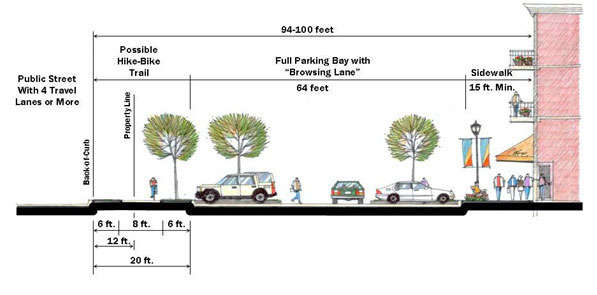Driven by New Urbanism, more than two dozen communities in the U.S. have loosened zoning restrictions in recent years. Cities are opting to use form-based codes, a concept less concerned with the use of buildings and more with their appearance and the way they relate to each other.
The goal of city planners is to shape the streetscape according to a vision for a neighborhood. The new approach has been called “performance-based zoning.” An example is a large development in Fremont, Calif., where the city council changed its approach to zoning on a nearly 900-acre development adjacent to a light rail station.
Planners started with several goals—a certain number of jobs, a certain number of homes including affordable homes, and strict standards for a low carbon footprint. The developers were allowed to design the project as they saw fit as long as they could achieve those goals.
The performance-based approach is contrary to the principle of separation of uses that led to color-coded zoning maps pinned up in most town halls. According to the old philosophy, ach zone had its own designated use: residential, commercial, or industrial. This method is increasingly seen as inappropriate for urban development—especially infill, downtown, and transit-oriented projects.
(http://www.citylab.com/housing/2014/08/braving-the-new-world-of-performance-based-zoning/375926/)
Related Stories
Codes and Standards | Jun 3, 2021
Conversion of large office buildings to residential will require revamped regulations
Post-1960 offices present ventilation, daylighting, and other challenges.
Codes and Standards | Jun 2, 2021
Dept. of Energy releases EnergyPlus and OpenStudio updates
New features include Python Plugin features and additional tabular reporting options.
Codes and Standards | Jun 1, 2021
Federal plan to double Canadian lumber tariffs draws intense criticism
Builders advised to stock up to deal with shortages.
Codes and Standards | Jun 1, 2021
Passive House standards proving their worth in multifamily sector
Energy performance beats conventionally built by 32% to 58%.
Codes and Standards | May 27, 2021
Pittsburgh combats construction fraud
Crackdown on tax, insurance, and workers’ comp malfeasance.
Codes and Standards | May 26, 2021
Proposal to add photovoltaic panels to the R2 Standard for electronics recycling
Hundreds of facilities in 33 countries could begin recycling PVs.
Codes and Standards | May 25, 2021
International Energy Agency lays out roadmap to net zero
Focus is on energy generation, but building efficiency also plays a role.
Codes and Standards | May 24, 2021
Biden Administration will make new investments in building energy efficiency
Focus on grid-interactive buildings; Energy Star expansion; new targets for energy, water reduction.
Codes and Standards | May 20, 2021
Solar panel trade group issues guidelines to rid use of components built with forced labor
Growing concern that PV industry is dependent on work camps in China.
Codes and Standards | May 19, 2021
Smart electric panels can aid transition to renewable energy
Allow customers better control of circuits; utilities can better manage demand.

















